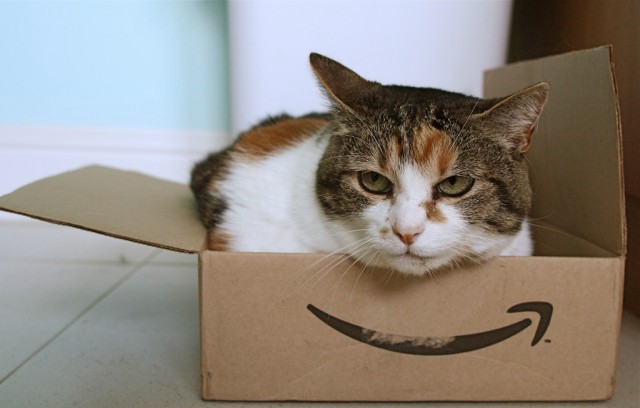In Which I Think of a Really Good Reason to Use Amazon Prime Now

Earlier this year, I tested and reviewed Amazon Prime Now for Boing Boing. At the time, I viewed my Amazon Prime Now purchases as a bit of a joke; after all, it took them an hour to get me the books and bobby pins I ordered, but I could have walked to Walgreens or Barnes & Noble and been back in just as much time.
But you know where Amazon Prime Now would really come in handy? When you’re a few days into a new apartment move. I am dealing with a cascading number of if/then calculations: if I get a large Tupperware or Pyrex bowl with a lid, then I can make muesli; if I get a coffeemaker, then I can make coffee BUT I also need to get a kitchen hutch because I need to put the coffeemaker near a wall outlet since it has one of those tiny cords (for safety!).
So: if kitchen hutch (or extension cord), then coffeemaker; if coffeemaker, then coffee. There are so many steps involved in even something very basic like “hot food” (the apartment does not have a microwave, and I do not own any pots or pans to use on the stove), and I am so very tempted to dump everything into Amazon Prime Now and order it like a pizza.
If I did take this step, the person who brought me my hutch and coffeemaker and saucepans and everything else I’ve got on my “to buy” list would probably be part of Amazon’s new Flex delivery program. As Wired explains:
The online retailer has for weeks been quietly operating a new program called Amazon Flex, according to a report from The Wall Street Journal, and has been testing it in its hometown of Seattle. Flex works in much the same way as other popular on-demand companies, including Uber and Postmates, do under the so-called 1099 model: Using an app platform, a network of independent contractors can sign up for flexible delivery shifts. On Amazon Flex, the company has these independent contractors collect packages from warehouses and bring them to customers’ homes in an hour or so.
Wired adds “this move is not surprising,” and indeed, I am not surprised.
It’s gotten to the point where I feel like I’m supposed to have an opinion about all of these gig economy services, and the opinion is supposed to be “they’re bad!” and I’m becoming less sure. I used the gig economy moving service Dolly to move my stuff into this apartment, and it was great. My Dolly Helper arrived with a huge dolly and loaded everything into his trailer. (I wanted to help by carrying boxes, but he was all “why should we carry boxes when we can put boxes on the dolly and roll it in?”) It was the easiest move I’ve ever done, and I was happy to pay $83 for it, plus the $25 tip I left my Helper.
So then I’m “okay, these services are great!” and then I start to remember a different series of if/then calculations: if employee, then unemployment benefits, then 401(k) with company match (maybe), then sick leave (maybe). It is funny how quickly I forget that all of those things exist; that there could be a world where my Dolly Helper was just as helpful and efficient and also received employee benefits.
But I like freelancing much better than I liked being an employee, even with the benefits.
It feels very weird to think this, like I am letting people down who should be getting more for their work. I also know that comparing my freelancing career to another gig economy career is very apples/oranges; like our anonymous poster yesterday, I also worked in the content mills and hustled my way to better gigs, but there isn’t a better Dolly. There isn’t a better Uber.
But my Dolly Helper was a retiree who seemed happy enough to make extra cash and schedule himself as he saw fit, which matches a recent New York Times article suggesting retirees are benefiting from the gig economy:
Before starting with TaskRabbit, Mr. Daub passed a background check and a training course. This summer, he began assembling Ikea furniture, a skill he learned as a homeowner. His published rate is $49 an hour, which includes a client services fee paid to the company. During July and August, working five or six hours a week, he estimated he earned about $2,000. “I’m making good money and making my own hours,” he said.
So I don’t know.
But I do know this: if I visit the thrift store and the consignment store and can’t find what I need, and if I am in my apartment with one item standing between me and a hot cup of coffee, and if I seriously can’t wait the two days for Amazon Prime, then I will definitely use Amazon Prime Now.
Photo credit: Stephen Woods
Support The Billfold
The Billfold continues to exist thanks to support from our readers. Help us continue to do our work by making a monthly pledge on Patreon or a one-time-only contribution through PayPal.
Comments